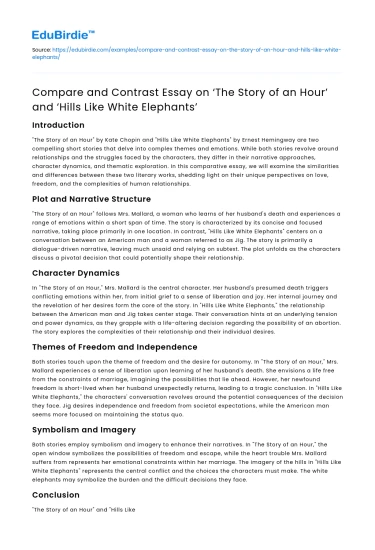Introduction
"The Story of an Hour" by Kate Chopin and "Hills Like White Elephants" by Ernest Hemingway are two compelling short stories that delve into complex themes and emotions. While both stories revolve around relationships and the struggles faced by the characters, they differ in their narrative approaches, character dynamics, and thematic exploration. In this comparative essay, we will examine the similarities and differences between these two literary works, shedding light on their unique perspectives on love, freedom, and the complexities of human relationships.
Plot and Narrative Structure
"The Story of an Hour" follows Mrs. Mallard, a woman who learns of her husband's death and experiences a range of emotions within a short span of time. The story is characterized by its concise and focused narrative, taking place primarily in one location. In contrast, "Hills Like White Elephants" centers on a conversation between an American man and a woman referred to as Jig. The story is primarily a dialogue-driven narrative, leaving much unsaid and relying on subtext. The plot unfolds as the characters discuss a pivotal decision that could potentially shape their relationship.
Save your time!
We can take care of your essay
- Proper editing and formatting
- Free revision, title page, and bibliography
- Flexible prices and money-back guarantee
Character Dynamics
In "The Story of an Hour," Mrs. Mallard is the central character. Her husband's presumed death triggers conflicting emotions within her, from initial grief to a sense of liberation and joy. Her internal journey and the revelation of her desires form the core of the story. In "Hills Like White Elephants," the relationship between the American man and Jig takes center stage. Their conversation hints at an underlying tension and power dynamics, as they grapple with a life-altering decision regarding the possibility of an abortion. The story explores the complexities of their relationship and their individual desires.
Themes of Freedom and Independence
Both stories touch upon the theme of freedom and the desire for autonomy. In "The Story of an Hour," Mrs. Mallard experiences a sense of liberation upon learning of her husband's death. She envisions a life free from the constraints of marriage, imagining the possibilities that lie ahead. However, her newfound freedom is short-lived when her husband unexpectedly returns, leading to a tragic conclusion. In "Hills Like White Elephants," the characters' conversation revolves around the potential consequences of the decision they face. Jig desires independence and freedom from societal expectations, while the American man seems more focused on maintaining the status quo.
Symbolism and Imagery
Both stories employ symbolism and imagery to enhance their narratives. In "The Story of an Hour," the open window symbolizes the possibilities of freedom and escape, while the heart trouble Mrs. Mallard suffers from represents her emotional constraints within her marriage. The imagery of the hills in "Hills Like White Elephants" represents the central conflict and the choices the characters must make. The white elephants may symbolize the burden and the difficult decisions they face.
Conclusion
"The Story of an Hour" and "Hills Like White Elephants" offer thought-provoking explorations of love, freedom, and the complexities of human relationships. While they differ in terms of plot structure, character dynamics, and narrative style, both stories highlight the struggle for autonomy and the consequences of choices made. "The Story of an Hour" delves into the internal journey of Mrs. Mallard and the fleeting nature of freedom, while "Hills Like White Elephants" delves into the dynamics of a relationship and the potential sacrifices individuals make to maintain it. Through their distinct storytelling approaches, Chopin and Hemingway present readers with compelling narratives that leave lasting impressions and invite contemplation on the intricacies of the human experience.






 Stuck on your essay?
Stuck on your essay?

